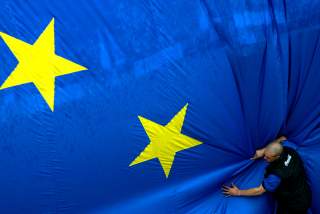Here's How the EU Is Taking Advantage of Trump's Blunders
Here's how Brussels is emerging as a power-player in the Middle East.
The last twenty months have been a rough stretch of time for the European Union. It’s no coincidence that throughout this period, Donald Trump has been president of the United States—a person European heads of state remain flummoxed by. Barack Obama was a multilateralist at his core who boasted durable personal relationships with European leaders like German Chancellor Angela Merkel, former French President Francois Hollande, and former British Prime Minister David Cameron. However, Trump is the living-and-breathing version of the American stereotype—an arrogant blowhard who is closed-minded, stubborn, set in his ways, ignorant of the specifics, and unafraid to take a hammer to the diplomatic, security, and trading relationships that have defined the transatlantic community for over half a century.
The Trump administration’s decision on August 31 to cut U.S. financial assistance to United Nations Relief and Works Agency for Palestine Refugees (UNRWA), the U.N. agency that houses, schools, and feeds about five million Palestinian refugees, is just the latest example of the canon-wide gulf between a Washington ruled by Trump and the European establishment. It’s increasingly clear that the transatlantic club is internally divided on some incredibly important subjects—the survival of UNRWA among them. What the White House views as an “irredeemably flawed operation” that merely perpetuates the Palestinian refugee issue, the EU regards as an essential contributor to middle east stability. One can only imagine how frustrating it must be for European politicians who are used to having the United States in their corner.
But it’s not all gloom for Europe. Indeed, with every unpopular, and at times illogical, move Donald Trump makes, he provides European leaders with an opportunity to flex their diplomatic muscles. The Donald Trump era of American politics could prove to be an era when the EU becomes a far more powerful player in international diplomacy.
Consider the record over the last year and a half.
Up until Trump situated himself in the Oval Office, the Israeli-Palestinian file was America’s domain. U.S. presidents in both political parties may have taken different approaches to the conflict or employed different tactics, but there was never doubt about Washington’s ultimate objective: the realization of the two-state solution with Israelis and Palestinians living side-by-side in peace and security. Americans were the power brokers, the mediators, and the facilitators shuttling between capitals and browbeating the parties to compromise.
Trump, in contrast, has brought a wrecking ball to the entire issue. Washington no longer appears to be as wedded to the two-state paradigm as it used to be. Items that were previously viewed as sacred and untouchable, like avoiding any mention of Jerusalem’s status until a final peace agreement was reached, are now being unilaterally taken off the table by the Americans. The Palestinian Authority has been so livid about the Trump administration’s handling of the Mideast peace portfolio that President Mahmoud Abbas has cut ties with the White House and forbidden his aides to even read Trump’s Mideast peace plan when it’s eventually released. With the gutting of UNRWA, the relationship between Washington and Ramallah will get worse before it gets better—assuming it gets any better at all.
A similar situation is seen in Iran. President Trump’s withdrawal from the Iranian nuclear agreement, an accord blessed by the U.N. Security Council and one Tehran has complied with, has shut the door to any further diplomacy with Iran on any issue of consequence. In an address last week, Supreme Leader Ayatollah Ali Khamenei was emphatic: talking with the Americans is a waste of time.
Yet, interestingly enough, Khamenei blessed further contacts with the Europeans in the same speech. “It is fine to establish ties, continue negotiations with Europe,” he asserted, even if it was highly unlikely the Europeans had the power to keep the deal alive.
On two critical issues, the Americans are walking away and leaving a void. The EU, an institution whose credibility has taken a beating—even before Brexit—on everything from migration and the euro to an aloofness from the average European, has ironically been gifted an opening by one of its most vociferous critics. Whether Trump wants to admit it or not, the Europeans are now depicted by much of the planet as more serious, sober-minded, and impartial diplomatic interlocutors than the United States.
On some of the most significant international security issues of our time, the EU has the chance to replace the U.S. as the prime mover-and-shaker of the diplomatic world. For the Europeans who are used to playing second-fiddle to Uncle Sam—focusing on the less sexy issues like climate change while the U.S. deals with the high-profile crises—an opportunity such as this cannot be dismissed. It is difficult to remember a time in the past when this was ever the case; American power was so overwhelming and such a fixture in the international system that most everyone assumed the United States would be the country running things.
Trump, however, is not a conventional president. He believes strongly that America’s allies, particularly in Europe, have been riding Washington’s coattails for far too long. It’s time for the EU to prove him wrong.
Daniel R. DePetris is a fellow at Defense Priorities.
Image: A worker adjusts a 150 metre-square European flag during a celebration in Brussels' Jubilee Park to mark the expansion of the European Union to 25 from 15 states on April 30, 2004. Cyprus, the Czech Republic, Estonia, Hungary, Latvia, Lithuania, Malta, Poland, Slovakia and Slovenia will join the European Union on May 1. UNICS REUTERS/Francois Lenoir Pictures of the Year 2004 FLR/CRB

